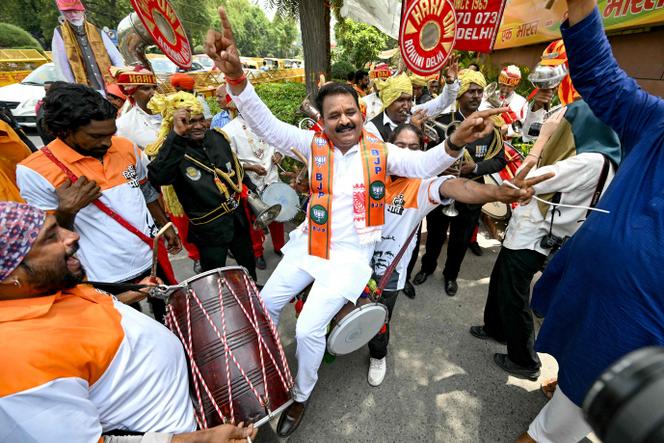


Narendra Modi, 73, is set to remain at India's helm, but with a serious warning from the electorate. The outgoing prime minister, after 10 years of uninterrupted power, won the parliamentary elections on Tuesday, June 4, with a narrow majority, at the end of a six-week marathon election. The results are currently being consolidated. Some 642 million Indians turned out to vote, braving the country's heatwave.
Modi matches his illustrious predecessor, Jawaharlal Nehru, the prime minister of independence, elected three times. But his victory falls short of expectations. Modi had asked Indians to give him 370 seats, 400 with his coalition, i.e. two-thirds of the majority in the Lok Sabha, the lower house of Parliament, required to amend the Constitution. He has failed, obtaining with his allies around 290 seats, barely more than the simple majority, set at 272 seats, despite his party's, the Bharatiya Janata Party (BJP), fierce campaigning on the ground and social media, and despite his personal involvement. The omnipresent prime minister held 206 public rallies and gave 80 interviews during the six-week campaign. Defenders of democracy and secularism can rest assured that Modi will not have the means to make major constitutional changes.
The state of Uttar Pradesh, India's most populous and strategic one with 80 MPs, illustrates the shift in opinion and the crystallization of anger. Modi had counted on the construction of the Ram temple in Ayodhya to win by a landslide. But on Tuesday morning, the opposition was in the lead, seemingly close to defeating the BJP, represented by the fanatical monk Yogi Adityanath.
The BJP is retreating to its strongholds in the Hindi-speaking belt, in the north and west of the country, and is barely making inroads in the previously impregnable south and east. However, the gains made in these regions do not compensate for losses elsewhere.
Over the past few weeks, many pockets of discontent had been heard on the ground. You just had to listen: farmers, unemployed young people, the poor stunned by inflation, Muslims stigmatized by Modi, those relegated by growth, Ladakhis on hunger strike, all were expressing their disappointment with the prime minister. The Modi magic is over. In his constituency of Benares, he won by a narrow margin.
For the opposition and the Congress, this could be the start of a process of reconquest, if they know how to remain united. For the first time since 2014, the Nehru-Gandhi party, which governed the country for a quarter of a century before going under, succeeded in rallying a grand coalition of around 30 parties, even if there were still around 100 constituencies where candidates were in competition. The Congress Party's strongman, Rahul Gandhi, finally assumed the role of leader while avoiding the trap of arrogance toward his partners, as the Congress had not nominated a candidate for the post of prime minister. Finally, the opposition chose campaign themes that resonated with the concerns of the poor and modest: social justice and equality.
You have 59.66% of this article left to read. The rest is for subscribers only.
